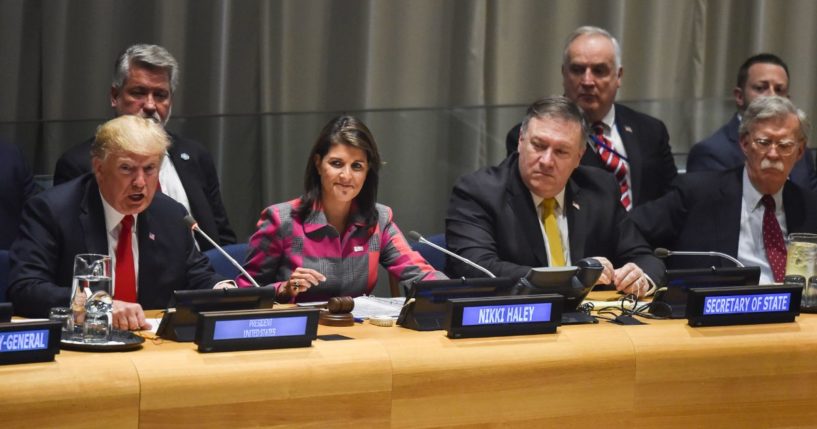
Ex-Trump Cabinet Official Announces Her Run for President, Challenging Former Boss
Nikki Haley, the former South Carolina governor and United Nations ambassador, announced her candidacy for president on Tuesday, becoming the first major challenger to former President Donald Trump for the 2024 Republican nomination.
The announcement, delivered in a tweeted video, marked an about-face for the former Trump Cabinet official, who said two years ago that she wouldn’t challenge her former boss for the White House in 2024.
Haley, 51, changed her mind in recent months, citing, among other things, the country’s economic troubles and the need for “generational change” — a possible reference to the advanced ages of President Joe Biden, 80, and Trump, 76.
“You should know this about me. I don’t put up with bullies. And when you kick back, it hurts them more if you’re wearing heels,” she said. “I’m Nikki Haley, and I’m running for president.”
Get excited! Time for a new generation.
Let’s do this! 👊 🇺🇸 pic.twitter.com/BD5k4WY1CP
— Nikki Haley (@NikkiHaley) February 14, 2023
Haley is the second in a long line of Republicans who are expected to launch 2024 campaigns in the coming months. Among them are Florida Gov. Ron DeSantis, former Vice President Mike Pence, former Secretary of State Mike Pompeo and Sen. Tim Scott of South Carolina.
Biden has said he intends to seek re-election in 2024, stalling any jostling for the Democratic nomination.
Haley has regularly boasted about her track record of defying political expectations, saying, “I’ve never lost an election, and I’m not going to start now.”
If elected, she would be the nation’s first female president.
In the three-and-a-half-minute video, Haley talked about growing up as the daughter of Indian immigrants. “Not black, not white — I was different,” she said.
“But my mom would always say, ‘Your job is not to focus on the differences but the similarities,’ and my parents reminded me and my siblings every day how blessed we were to live in America,” she said.
Haley dismissed those who say America’s founding principles are “evil” and “racist.” “Nothing could be further from the truth,” she said, pointing to genocide and oppression in other countries.
“Even on our worst day, we are blessed to live in America,” she said.
Haley said “the Washington establishment has failed us over and over and over again” and called for “a new generation of leadership,” which has become the refrain of her messaging leading up to the launch.
She was an accountant when she launched her first bid for public office, defeating the longest-serving member of the South Carolina House in 2004. Three terms later and with little statewide recognition, Haley mounted a long-shot campaign for governor against a large field of experienced politicians.
She racked up a number of high-profile endorsements, including from the sitting South Carolina governor, Mark Sanford, and former Alaska Gov. Sarah Palin, a tea party darling.
With her 2010 victory, Haley became South Carolina’s first female and minority governor — and the nation’s youngest at 38. She earned a speaking slot at the 2012 Republican National Convention and gave the GOP response to President Barack Obama’s State of the Union in 2016.
A defining moment of Haley’s time as governor came after the 2015 murders of nine black parishioners in a Charleston church by a self-avowed white supremacist who had been pictured holding Confederate flags.
For years, Haley had resisted calls to remove the Confederate flag from the Statehouse grounds, but after the massacre, she advocated for legislation to remove the flag. It came down less than a month after the murders.
In the 2016 presidential primary, Haley was an early supporter of Florida Sen. Marco Rubio, later shifting to Texas Sen. Ted Cruz. She ultimately said she would back the party’s nominee.
Shortly after Trump’s victory, he tapped Haley to be his U.N. ambassador, and she became the first Indian American in a presidential Cabinet.
During her nearly two-year tenure, she feuded at times with other Trump administration officials.
One of Haley’s most memorable moments as U.N. ambassador came in 2018 after National Economic Council Director Larry Kudlow suggested she had suffered “momentary confusion” when she said Russian sanctions were imminent.
“With all due respect, I don’t get confused,” she responded. The first half of the quote became the title of her 2019 memoir.
Her departure from the job later that year fueled speculation that she would challenge Trump in 2020 or replace Pence on the ticket. She did neither.
Instead, Haley returned to South Carolina, where she bought a home on Kiawah Island, joined the board of aircraft manufacturer Boeing Co., launched herself on the speaking circuit and wrote two books, including the memoir.
After the Jan. 6, 2021, incursion of the U.S. Capitol, Haley initially cast doubts on Trump’s political future but said she wouldn’t challenge him in 2024. She later shifted course, citing inflation, crime, drugs and a “foreign policy in disarray” among her reasons for considering a White House campaign.
During his South Carolina stop last month, Trump told WIS-TV that Haley had called to seek his opinion on running for president. He pointed out her earlier pledge not to run against him but said he made no attempts to stop her.
“She said she would never run against me because I was the greatest president, but people change their opinions, and they change what’s in their hearts,” Trump said. “So I said, if your heart wants to do it, you have to go do it.”
The Western Journal has reviewed this Associated Press story and may have altered it prior to publication to ensure that it meets our editorial standards.
Truth and Accuracy
We are committed to truth and accuracy in all of our journalism. Read our editorial standards.
Advertise with The Western Journal and reach millions of highly engaged readers, while supporting our work. Advertise Today.












